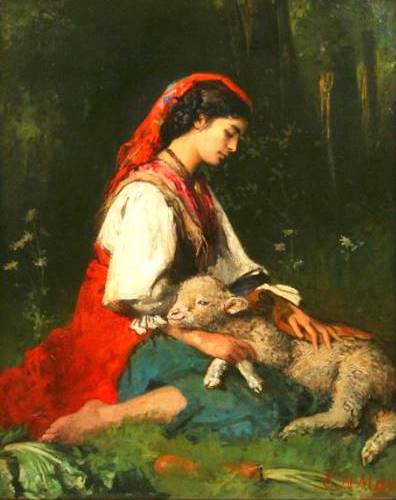I've been working on/sitting on a post about the Song of Solomon and marriage for some time now. While I was studying, I came across an interesting note in my Bible, "The Song is read annually at the Feast of the Passover, as Ruth is read at Pentecost; Lamentations on the 9th of Ab; Ecclesiastes at the Feast of Tabernacles; and Esther at the Feast of Purim." It struck me as odd. What could a story about love and kidnapping have to do with the Passover? It took me a bit, but the answer came--when viewed in its proper context, The Song of Solomon is the exact same story.
 |
| Pictured: This is where love begins. When you look after someone's sheep. |
"Proper Context"
It is my personal opinion the Song of Solomon is one of the most misunderstood and under-appreciated books in the entire Bible. Most of the problems come from misinterpretation of the story of the book. I cannot begin to count how many times I've heard "It's about King Solomon and his lady love!". From that interpretation comes a slew of other (equally wrong) morals. To begin comparing the SoS to the Passover, we have to establish the actual story. To begin, the story is a lot less "Solomon in love!" and a lot more like this:
| Source |
I'll go more into detail of the hows and whys of the story in the upcoming marriage post. For now, I'll just another quote from my Bible that sums it up quite neatly,
"...It is a poem based on the true facts of a story which unfolds itself as it proceeds. Various interpretations have been given of it: the literal, the allegorical, and the typical. The allegorical embrace Jehovah and Israel (which was the view of the Jewish commentators); the Roman Catholic views it of "Christ and the Church"; the typical view regards it as a type of Solomon's nuptials, or as that of Christ and the Gentiles. The allegorical view puts the coarse flatteries and language of a seducer in the lips of "Christ", which is inconsistent with His dignity and holiness. it is the language of seduction put into the mouth of Him "Who never spake as man spake". The number of speakers forbids all the interpretations which depend on their only being two. There are seven in all, and they can be easily distinguished by the Structures: (1) The Shulamite; (2) the daughters of Jerusalem; (3) Solomon; (4) the shepherd lover of the Shulamite; (5) the brothers of the Shulamite; (6) the companions of the shepherd; (7) the inhabitants of Jerusalem."
The Connection to Passover
The story of Passover, or, really, the story of Exodus, is a long one, fraught with miracles, belief, and drama. To sum it up: after the time of Joseph and the famine his family suffered, the Israelites relocated to Egypt. Things went well at first, but then, there was a new Pharaoh who did not respect or trust them. He instituted more laws, and as time went on, the Israelites found themselves slaves to the Egyptians. Much time passed. The Israelites lamented their captivity, and, finally, a way out was provided. Moses, the son of Amram and Yoshabed, was, by a fluke of destiny, raised in the household of the family of the Pharaoh. After seeing the oppression of his people, Moses, with the help of God, manned up and led them out of there after a series of 10 awful plagues. The Israelite people went into the wilderness to found their own land where they will be established as a people, protected by God.
The connection between the Song of Solomon and the story of the Exodus is simple. The Shulamite parallels the Israelite people. Solomon represents Egypt, and the shepherd lover and God play the same role. In the beginning of the stories, the Shulamite/Israelite people are living freely, beloved of their shepherd/God. Things are grand. But then, a richer, more powerful, and corrupting force appears on the stage--Solomon/Egypt. The Shulamite/Israelites are taken from their home. They are pressured to change their ways and submit the the power of Solomon/Egypt, but the Shulamite/Israelites just want to go home to their shepherd/God who truly loves them. Time passes, and the pressure is great, but the Shulamite/Israelites hold out. They will not lose faith in their shepherd/God. Finally, a miracle! Solomon/Egypt, under some duress, realize the futility of their mission and allows the Shulamite/Israelite to go home. The Shulamite/Israelites, now free, rejoice, and rush back to their true home with their shepherd/God.
| Free, at last. |
Conclusion
The story of the Exodus is not a one-trick pony. It's not just an ancient history adventure--it's a tale of freedom and redemption. Similarly, the Song of Solomon is not just a love story; it's a morality tale that encourages us to show integrity and strength in our everyday lives. They both show the rewards of sticking to your guns, and put together, the two teach the same lesson, "If you continue in My word, then you are truly disciples of Mine; and you will know the truth, and the truth will set you free" (John 8:31-32).
No comments:
Post a Comment